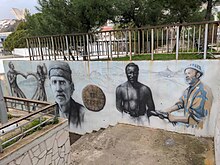Rizo Šurla
Rizo Šurla | |
|---|---|
Ризо Шурла | |
 Mural in Ulcinj depicting afro-albanian photographer Rizo Šurla (second from the right) (16/02/2024) | |
| Born | 12 January 1922 |
| Died | 11 February 2003 (aged 81) |
| Nationality | Yugoslav (now Montenegrin) |
| Occupation(s) | Photographer, actor |
Rizo Šurla (Montenegrin: Ризо Шурла; Albanian: Rizo Shurdha; 12 January 1922 – 11 February 2003), also known as Rizo Harapi, was a Montenegrin photographer, actor and anti-fascist fighter who fought in the ranks of the Yugoslav Partisans during World War II.
Biography
Rizo Šurla was born on 12 January 1922 in Ulcinj, then part of the Kingdom of Yugoslavia. His family belonged to the Afro-Albanian community of Ulcinj.[1] African slaves had been brought by the captains of the fleet of Ulcinj in the 18th century.[2] In the 19th century, they gained their freedom and began to integrate themselves in the local community. His father, Saidi, was a direct descendant of the first Africans who settled in Ulcinj and his mother, Fatima was a local from Ulcinj.[3] In his youth he was involved in boxing and worked as a waiter in Dubrovnik.[4] He then went to Belgrade, where he learned the craft of photography.[2] During World War II, he joined the Yugoslav Partisans.[5] After the war, he returned to Ulcinj, where he opened the first photographic studio in the city, which for a long time was the only one. In 1976 he played in the movie Jagoš and Uglješa.[3] He married a Montenegrin from Ulcinj named Nada Račić, with whom he had two children.[2]
He died on 11 February 2003 in his hometown. He was one of the last black representatives in the city.[2]
References
- ^ Canka, Mustafa (2013). "Only Memories and Emptiness Remain: The History of Ulcinj's Afro-Albanian Community in Montenegro". LeftEast.
- ^ a b c d "Riza otišao u legendu". www.novosti.rs (in Serbian (Latin script)). Retrieved 13 June 2020.
- ^ a b "Rizo Šurla, crnac iz Crne Gore: Uvek sаm se osećаo Jugoslovenom, nаšа zemljа je jedinstvenа u svetu". Retrieved 13 June 2020.
- ^ "Dubrovnik 1933: RIZO SHURDHA PARA KAFENESË SË QYTETIT (foto) | Lajme me te fundit nga Ulqini dhe rajoni". 5 December 2016. Retrieved 13 June 2020.
- ^ "Potomci afričkih robova trajno obilježili istoriju Ulcinja + Foto". Lajme nga Ulqini (in Albanian). 2 February 2013. Retrieved 13 June 2020.
